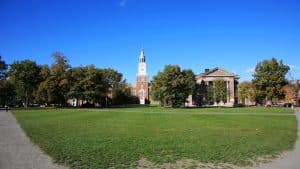Exploring the World of Dartmouth Physics
In this article, we’ll take you on a journey through the world of Dartmouth’s physics program, its history, achievements, and future. We’ll explore the top research areas and programs, meet the professors who shape the department and take a glimpse into life as a student of physics at Dartmouth. Join us as we delve into the fascinating world of Dartmouth physics!
The History of Dartmouth Physics: A Timeline of Milestones and Achievements
Did you know that Dartmouth College is the birthplace of the modern atom smasher? It’s true! Physics has been an integral part of Dartmouth’s academic life since the college’s founding in 1769. In 1938, Ernest Lawrence (who later won a Nobel Prize in Physics) and his team of physicists designed and built the first cyclotron at Dartmouth, paving the way for modern particle physics research.
Since then, Dartmouth has continued to be a leader in the field of physics. In 1955, Dartmouth physicist Edward Purcell won the Nobel Prize in Physics for his work in nuclear magnetic resonance. And in 1995, the team at Dartmouth’s Neutron Science Laboratory was the first to discover a new class of superfluid helium-4.
In addition to these achievements, Dartmouth’s physics department has also made significant contributions to the field of astrophysics. In 2006, Dartmouth physicist Robert Caldwell proposed a new theory of dark energy, which has since been widely studied and debated in the astrophysics community. And in 2018, Dartmouth astrophysicist Ryan Hickox led a team that discovered a supermassive black hole in a distant galaxy, shedding new light on the formation and evolution of galaxies.
Today, Dartmouth’s physics department continues to push the boundaries of scientific knowledge through cutting-edge research and innovative teaching methods. From studying the fundamental laws of the universe to developing new technologies that will shape our future, Dartmouth physicists are at the forefront of discovery and exploration.
The Role of Dartmouth Physics in Advancing Scientific Research
The Department of Physics and Astronomy at Dartmouth College has played a crucial role in advancing scientific research through groundbreaking discoveries and innovative research projects. For example, Dartmouth physicists have made significant contributions to particle physics research at the Large Hadron Collider (LHC) in Switzerland. Working with international partners, Dartmouth scientists helped discover the Higgs boson, a particle that gives mass to other particles.
Dartmouth physicists are also involved in research related to energy and the environment, astrophysics, and condensed matter research. The department collaborates with peer institutions and research facilities around the world to advance scientific knowledge and enhance the impact of its research.
One of the recent research projects undertaken by the Department of Physics and Astronomy at Dartmouth College is related to the development of new materials for solar cells. The team of researchers is working on designing and synthesizing new materials that can efficiently convert sunlight into electricity. This research has the potential to revolutionize the field of renewable energy and make solar power more accessible and affordable for everyone.
The Top Physics Programs and Research Areas at Dartmouth College
Dartmouth’s Department of Physics and Astronomy offers a wide range of programs and research areas for students and faculty. Among the top programs are astrophysics, condensed matter physics, plasma physics, high-energy particle physics, and biophysics.
Dartmouth physicists work on a wide range of research projects, from exploring the properties of nanoscale magnetic materials to studying the behavior of subatomic particles. The department also offers summer research programs for undergraduate students, allowing them to gain hands-on experience and prepare for careers in physics.
In addition to the research areas mentioned above, Dartmouth’s Department of Physics and Astronomy also has a strong focus on interdisciplinary research. Physicists collaborate with researchers in other fields, such as engineering, computer science, and biology, to tackle complex problems and develop innovative solutions.
For example, Dartmouth physicists are working with computer scientists to develop new algorithms for quantum computing, and with biologists to study the mechanics of cell division. This interdisciplinary approach allows for a more comprehensive understanding of the natural world and opens up new avenues for scientific discovery.
Meet the Professors: An In-Depth Look at the Experts Shaping Dartmouth Physics
The faculty at Dartmouth’s Department of Physics and Astronomy bring a wealth of expertise and experience to the program. From Nobel laureates to rising stars in the field, the department’s professors are leaders in their respective areas of research.
For example, Professor Miles Blencowe is a leading expert in quantum computing and quantum metrology. His research has led to breakthroughs in the development of new technologies for quantum computing and communication. And Associate Professor James LaBelle conducts research on the solar wind and space plasmas, working to understand the fundamental processes that drive magnetic reconnection and other space weather phenomena.
Another notable professor in the department is Dr. Karen Daniels, whose research focuses on the physics of soft matter. She studies the behavior of materials such as gels, foams, and colloids, and how they can be manipulated for various applications. Her work has implications in fields such as biomedicine, materials science, and engineering.
In addition, Professor Robert Caldwell is a leading expert in cosmology and dark energy. His research aims to understand the nature of the universe and its evolution, including the mysterious force that is causing the expansion of the universe to accelerate. His work has implications for our understanding of the fundamental laws of physics and the fate of the universe.
The Future of Physics: How Dartmouth is Preparing Students for Tomorrow’s Challenges
Dartmouth’s Department of Physics and Astronomy is committed to preparing students for the challenges of the future. The department offers a rigorous undergraduate curriculum that emphasizes problem-solving skills, critical thinking, and advanced research methods.
Students are encouraged to participate in research projects and to pursue graduate studies. The department also offers a Ph.D. program in physics and astronomy, providing students with opportunities to work alongside leading experts in their field.
In addition to the undergraduate and graduate programs, the Department of Physics and Astronomy at Dartmouth also offers various opportunities for students to engage in interdisciplinary research.
Students can collaborate with faculty and students from other departments, such as engineering, computer science, and mathematics, to tackle complex problems that require a multidisciplinary approach.
The department also hosts a number of events and seminars throughout the year, featuring guest speakers and experts in various fields of physics and astronomy. These events provide students with the opportunity to learn about cutting-edge research and to network with professionals in their field.
The Impact of Dartmouth Physics on Industry and Technology
Dartmouth’s Department of Physics and Astronomy has had a significant impact on industry and technology through its research and collaboration with industry partners. For example, Dartmouth physicists have collaborated with IBM to develop new technologies for quantum computing. The department has also worked with companies like DuPont and General Electric to develop new materials and technologies for energy and environmental applications.
In addition to these collaborations, Dartmouth’s Department of Physics and Astronomy has also made significant contributions to the field of medical technology. Researchers have developed new imaging techniques and technologies that have been used in medical diagnosis and treatment.
The department has also worked with medical device companies to develop new devices and technologies for patient care. These advancements have had a significant impact on the healthcare industry and have improved patient outcomes.
Campus Life: A Student’s Guide to Studying Physics at Dartmouth College
As a physics student at Dartmouth, you’ll be part of a vibrant and supportive community. The department offers a wide range of extracurricular activities, including clubs, seminars, and research opportunities.
Students are encouraged to participate in academic competitions and conferences, giving them opportunities to showcase their skills and build professional networks. The department also offers resources for students seeking internships and career opportunities in the field of physics.
Additionally, the physics department at Dartmouth College has state-of-the-art facilities and equipment, including a high-performance computing cluster and a variety of specialized laboratories.
These resources allow students to conduct cutting-edge research and gain hands-on experience in their field of study. The department also has a strong focus on interdisciplinary collaboration, providing opportunities for physics students to work with faculty and students from other departments, such as engineering, mathematics, and computer science.
Beyond the Classroom: Extracurricular Activities for Aspiring Physicists at Dartmouth
At Dartmouth, there are many ways to get involved with physics outside of the classroom. The department offers a variety of clubs and organizations, including the Society of Physics Students and the Women in Science Project. These groups provide opportunities for students to network with peers, learn about career opportunities, and engage in community service projects.
In addition to these clubs, Dartmouth also hosts a number of physics-related events throughout the year. These events include guest lectures from prominent physicists, workshops on cutting-edge research, and physics-themed movie nights. Attending these events can help students stay up-to-date on the latest developments in the field and connect with other physics enthusiasts.
For students who are interested in pursuing research, Dartmouth offers a number of opportunities to work with faculty members on physics projects. These research experiences can be incredibly valuable for students who are considering graduate school or a career in physics. Students can also apply for summer research programs at other institutions to gain additional research experience.
Applying to the Dartmouth Physics Program: Tips, Tricks, and Common Mistakes to Avoid
If you’re interested in studying physics at Dartmouth, there are a few things you should keep in mind when applying. The department recommends that applicants have a strong background in math and science and have taken courses in calculus and physics.
It’s also important to demonstrate strong critical thinking and problem-solving skills in your application materials. The department looks for students who are passionate about physics and are eager to engage in research and academic pursuits. And, perhaps most importantly, make sure to proofread your application materials carefully to avoid common mistakes.
Additionally, the Dartmouth Physics Program offers a variety of resources and opportunities for students to enhance their learning experience. These include research opportunities with faculty members, access to state-of-the-art equipment and facilities, and participation in physics-related clubs and organizations. The department also hosts regular seminars and events featuring guest speakers and experts in the field. By taking advantage of these resources, students can gain valuable hands-on experience and develop a deeper understanding of the subject matter.
Exploring Careers in Physics: Opportunities for Graduates of the Dartmouth Program
Dartmouth physics graduates are well-prepared for a wide range of careers in academia, industry, and government. Many go on to graduate studies in physics or related fields, while others pursue careers in engineering, technology, or finance.
Dartmouth’s Department of Physics and Astronomy offers resources for students and alumni seeking career opportunities, including job fairs, networking events, and career advising. Students are encouraged to explore career options early on in their academic careers and to take advantage of the department’s resources and support.
In addition to the department’s resources, Dartmouth physics graduates also have access to a strong alumni network. Many alumni are eager to mentor and provide guidance to current students and recent graduates. The department also hosts alumni events and networking opportunities, allowing students to connect with successful professionals in their field of interest. This network can be invaluable in finding job opportunities and advancing in one’s career.
The Intersection of Physics and Social Justice: How Dartmouth is Making a Difference through Science
At Dartmouth’s Department of Physics and Astronomy, science and social justice intersect in important ways. The department is committed to promoting diversity and inclusivity in the sciences and to using science to address pressing social issues.
For example, Dartmouth physicists are involved in efforts to address climate change and improve access to clean energy in underserved communities. And the department’s Women in Science Project works to promote gender equity and encourage young women to pursue careers in the sciences.
In addition to these initiatives, the department is also actively involved in researching and developing new technologies that can be used to improve healthcare outcomes for marginalized communities.
For instance, Dartmouth physicists are working on developing new imaging techniques that can help diagnose diseases more accurately and at an earlier stage, which can be particularly beneficial for communities with limited access to healthcare resources.
Furthermore, the department is committed to promoting science education and literacy among underrepresented groups. Through partnerships with local schools and community organizations, Dartmouth physicists are working to inspire and engage young people from diverse backgrounds in the sciences, with the goal of increasing diversity in STEM fields and promoting social mobility.
Funding Research and Innovation in Dartmouth’s Department of Physics
To continue its important work in advancing scientific research and innovation, Dartmouth’s Department of Physics and Astronomy relies on the support of donors and funding sources.
Individuals and organizations can support the department’s groundbreaking research and educational programs through gifts and donations. By investing in Dartmouth Physics, donors can help shape the future of the field and make a meaningful impact on science and society.
One of the current research projects being conducted in Dartmouth’s Department of Physics is focused on the development of new materials for use in renewable energy technologies. The team is exploring the use of organic semiconductors and other novel materials to create more efficient and cost-effective solar cells and other energy devices. This research has the potential to significantly impact the field of renewable energy and contribute to the development of sustainable energy solutions for the future.
Conclusion
Thank you for joining us on this journey through the world of Dartmouth physics. Whether you’re a student, faculty member, or just an enthusiast of the subject, there’s no denying the important role that Dartmouth’s physics program has played in shaping the field and advancing scientific research. We hope this article has given you a deeper understanding and appreciation for the incredible work being done at Dartmouth’s Department of Physics and Astronomy.









































